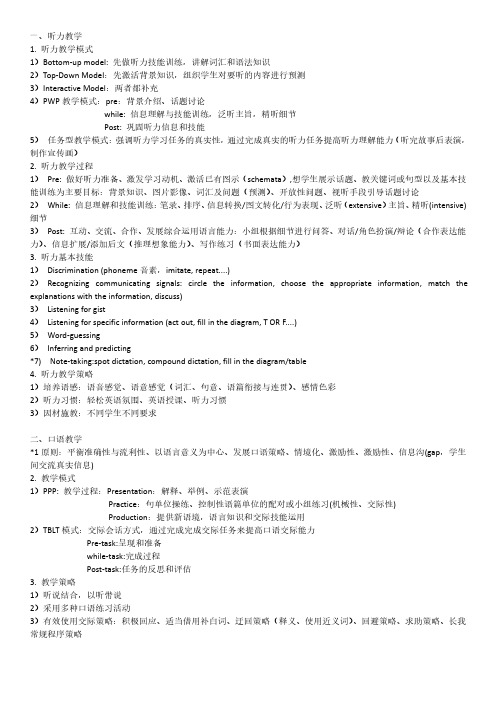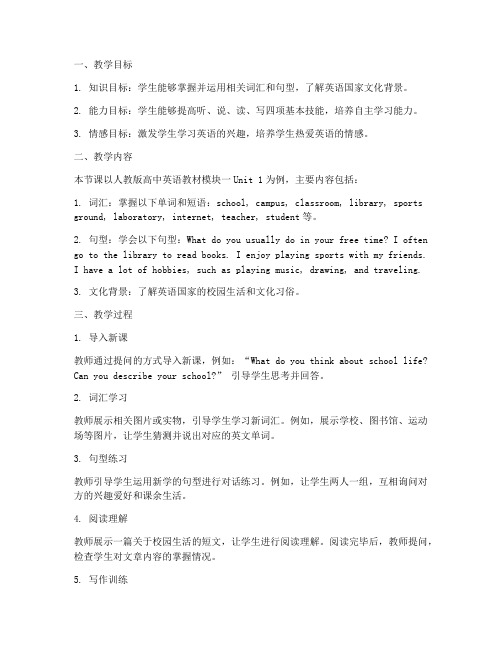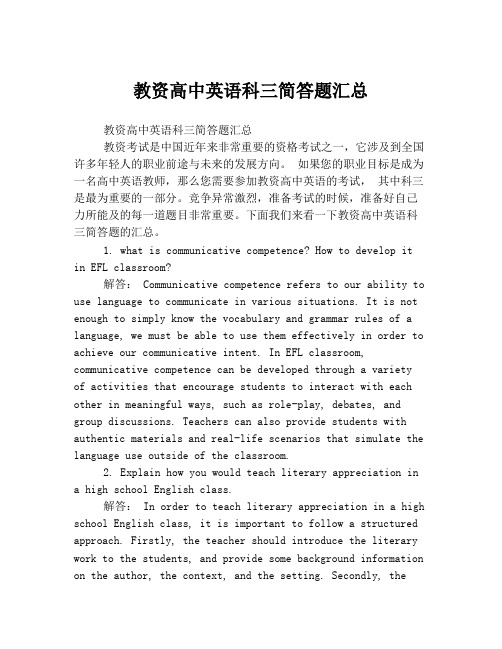高中英语教师资格科目三
高中英语教资科三考试题型

高中英语教资科三考试题型一、在阅读理解部分,以下哪一项最能概括文章的主旨大意?A. 介绍英国的教育体系B. 探讨全球气候变化的影响C. 分析互联网技术的历史发展D. 阐述太阳能的利用前景(答案:C)二、下列哪个词汇在句子中作为定语,修饰名词“book”?句子:I found an interesting book in the library yesterday.A. foundB. interestingC. libraryD. yesterday(答案:B)三、以下哪个短语用于表达“对…感到满意”?A. be satisfied withB. be bored ofC. be worried aboutD. be surprised at(答案:A)四、在下列句子中,哪一项是正确使用了虚拟语气的结构?A. If I have time, I will visit you tomorrow.B. If I had time, I would visit you tomorrow.C. If I have time, I would visit you tomorrow.D. If I had time, I will visit you tomorrow.(答案:B)五、以下哪个句子中的动词时态使用不当?A. They have been studying English for five years.B. She has just arrived at the airport.C. He will be studying when I call him tonight.D. They studied English since 2018.(答案:D)六、下列哪个选项是正确的被动语态结构?A. The book was written by him last year.B. The book wrote by him last year.C. The book is writing by him last year.D. The book written by him last year.(答案:A)七、在下列句子中,哪一项正确地使用了倒装句结构?A. Only when he finished his work did he realize how tired he was.B. Only when he finished his work he realized how tired he was.C. He realized how tired he was only when finished his work.D. Only did he realize how tired he was when he finished his work.(答案:A)八、以下哪个选项中的词组搭配不当?A. make a decisionB. take a riskC. give a suggestion toD. have a rest(答案:C,应为“make a suggestion to”或“give advice to”)。
高中英语教资科目三知识点总结

高中英语教资科目三知识点总结1. 词汇量的积累是学好英语的基础,需要大量的阅读和实际应用来巩固记忆。
2. 掌握词汇的各种变形形式能够有效提高阅读和写作的能力。
3. 词汇的拼写和发音是基础,需要通过反复练习来达到熟练掌握的水平。
4. 需要理解词汇的词义和词性,并能够准确运用于句子和语境中。
1. 英语语法是学习英语的基础,需要系统学习各种句型和语法规则。
2. 需要掌握一些常见的句子结构和语法现象,如倒装、虚拟语气等。
3. 了解并熟练运用各种时态和语态,包括一般现在时、过去时、将来时等。
4. 熟悉宾语从句、定语从句、状语从句等各种从句结构。
1. 高中英语阅读理解是考试的重点,需要通过大量的阅读来提高理解能力。
2. 在阅读过程中要注意提取文章的关键信息,理解文章的主题和中心思想。
3. 掌握一些阅读技巧,如扫读、略读、精读等,以提高阅读速度和准确度。
4. 训练记忆力和理解力,通过做题来巩固阅读理解的能力。
1. 英语写作需要掌握一些常用句型和表达方式,可以通过积累写作素材来提高写作能力。
2. 写作时要注意组织结构和段落的逻辑性,清晰明了地表达自己的观点和思路。
3. 通过多写、多练提高写作的流畅度和连贯性,避免语法错误和拼写错误。
4. 多读一些范文和优秀英语作品,学习他人的写作技巧和表达方式。
总结:高中英语教资科目三知识点总结,包括词汇篇、语法篇、阅读篇和写作篇。
在学习过程中,要注重词汇量的积累、语法规则的学习、阅读理解的训练和写作能力的提高。
通过系统的学习和练习,可以逐步提高英语能力,为教资考试做好准备。
教师资格证高中英语科三笔记整理

一、听力教学1.听力教学模式1)Bottom-up model:先做听力技能训练,讲解词汇和语法知识2)Top-Down Model:先激活背景知识,组织学生对要听的内容进行预测3)Interactive Model:两者都补充4)PWP教学模式:pre:背景介绍、话题讨论while:信息理解与技能训练,泛听主旨,精听细节Post:巩固听力信息和技能5)任务型教学模式:强调听力学习任务的真实性,通过完成真实的听力任务提高听力理解能力(听完故事后表演,制作宣传画)2.听力教学过程1)Pre:做好听力准备、激发学习动机、激活已有图示(schemata),想学生展示话题、教关键词或句型以及基本技能训练为主要目标:背景知识、图片影像、词汇及问题(预测)、开放性问题、视听手段引导话题讨论2)While:信息理解和技能训练:笔录、排序、信息转换/图文转化/行为表现、泛听(extensive)主旨、精听(intensive)细节3)Post:互动、交流、合作、发展综合运用语言能力:小组根据细节进行问答、对话/角色扮演/辩论(合作表达能力)、信息扩展/添加后文(推理想象能力)、写作练习(书面表达能力)3.听力基本技能1)Discrimination(phoneme音素,imitate,repeat....)2)Recognizing communicating signals:circle the information,choose the appropriate information,match the explanations with the information,discuss)3)Listening for gist4)Listening for specific information(act out,fill in the diagram,T OR F....)5)Word-guessing6)Inferring and predicting*7)Note-taking:spot dictation,compound dictation,fill in the diagram/table4.听力教学策略1)培养语感:语音感觉、语意感觉(词汇、句意、语篇衔接与连贯)、感情色彩2)听力习惯:轻松英语氛围、英语授课、听力习惯3)因材施教:不同学生不同要求二、口语教学*1原则:平衡准确性与流利性、以语言意义为中心、发展口语策略、情境化、激励性、激励性、信息沟(gap,学生间交流真实信息)2.教学模式1)PPP:教学过程:Presentation:解释、举例、示范表演Practice:句单位操练、控制性语篇单位的配对或小组练习(机械性、交际性)Production:提供新语境,语言知识和交际技能运用2)TBLT模式:交际会话方式,通过完成完成交际任务来提高口语交际能力Pre-task:呈现和准备while-task:完成过程Post-task:任务的反思和评估3.教学策略1)听说结合,以听带说2)采用多种口语练习活动3)有效使用交际策略:积极回应、适当借用补白词、迂回策略(释义、使用近义词)、回避策略、求助策略、长我常规程序策略4.教学活动1)控制性/机械性活动:结构化活动:阅读、背诵、模仿、重复(controlled or mechanical类交际:以结构为主的对话:编对话、分角色阅读、复述...2)半控制性/机械系活动(semi-):识别:通过询问识别不同的图片或匹配图片发现:通过提问发现故事或图片的顺序,寻找丢失信息重组:A通过询问B进行顺序重组解决:根据火车时刻表提出最佳路线3)开放性或创造性活动(open or creative):模拟真实情境进行角色扮演、辩论、问卷访谈、小组讨论、即兴演讲等活动三、阅读教学1.原则1)读写结合,以读带写2)泛读与精读结合3)分层阅读:略读-寻读-细读-研读4)不同文体,不同教学方法5)真实阅读,流畅阅读原则2.教学模式1)Top-down:激发学生的知识库和对文章内容的猜测2)Bottom-up:读者从字母到单词到句子,逐个进行解码从而理解全体3)Interactive-compensatory:既强调背景知识、上下文预测的重要性,又不忽视单词、短语的解码能力3.教学过程PWP1)Pre:准备、导入阶段:明确阅读的目的和任务,激发动机,预测内容,介绍背景,语境中呈现新词,扫清阅读和文化障碍2)While:核心环节,信息识别和理解能力的培养都在本阶段完成3)Post:表现评估、策略评估、质量检查、口头或笔头练习、将阅读信息与材料外的信息相连4.阅读基本技能及教学活动1)略读(Skimming):了解文章大意,起始句、段首句、主题句相关信息词2)寻读(scanning):带有目的性,有针对性寻找答案3)Word-guessing4)Predicting(主题和体裁,结构预测)5)Inferring(言外之意、语气、态度)6)Recognizing the Referrence四、写作教学1.原则1)模仿与应用性相结合2)重过程与重结果想结合3)写作与听说、阅读有机结合4)学习性写作与交际性写作相结合2.教学模式1)重结果(production):准确性,一稿写作2)重过程(process)3)重内容写作(content)3.教学过程1)Create a motivation to write:清楚阐明写作要求和目的,运用课本提供的范文激活学生相关知识2)Brainstorming:集体讨论3)Mapping:记录、整理思绪4)Freewriting:不需要关注太多语法或者拼写问题,培养流利写作能力5)Outlining6)Drafting7)Editing:self/peer-editing8)Revising:教师指导组织和结构9)Proofreading:指出语法错误10)Conferencing:私人交流或全班交流,鼓励4.教学策略1)加强英语语言输入2)加强基础写作训练:释义练习、断句与标点练习、句子模仿与改写练习;短文改错、连贯性训练、连句成文、语篇结构训练、框架写作、文体分类模仿、自由写作训练3)强化英语语言思维5.练习形式1)控制性写作controlled:抄写、填空、完成句子、句型转换2)指导性写作guided:段落写作、摘要性写作、基于调查问卷的写作、应用性写作3)交流性写作expressive writing:随意性写作、叙述和描述写作五、语音教学1.教学内容1)语音层次:音标教学:听-看-模仿-正音-辨音-拼读读音规则教学2)语流层次:stresses of sentencesRhythms(重轻、长短、快慢)Sense Group and Pause:意群划分和停顿Liaison and loss of Plosion:连读和失去爆破Intonation2.教学原则:Accuracy,long-term development,comprehensiveness,pertinence,interest,communication,authenticity3.训练方法发音练习1)Perception practice:minimal pairs,which order,same or difference,odd one out,completion2)Production practice:listen and repeat,fill in blanks,make up sentences,use meaningful context,uese pictures,use tongue twister重音和语调练习1)use guestures2)Use the voice3)Use the blackboard4.语音教学策略手段多样化,材料多样化,让学生接触不同口音,在情境中进行六、词汇教学1.教学内容1)word meaning:denotative(conceptual)meaning,connotative meaning(内涵意义2)Word information3)Word usage4)Word strategies:controlling strategies,resource strategies,cognitive strategies,memory strategies2.原则:选择(经常出现,可用于活动,代表性)、系统性、文化性、呈现、运用3.教学模式1)PPT模式:presentation,practice,testing2)TBLT模式:呈现-任务(完成听力、阅读与写作中充分使用单词)-展示作品-评价与练习4.教学方法1)呈现方法:意义、结构和用法、策略呈现2)巩固方法:贴标签,找不同,描述并画图,记忆游戏,单词串烧,宾果游戏,词语联想,找同义词和反义词,词语搭配,归类3)记忆策略:语境记忆,联想记忆(相似、对比和包容联想,话题联想,横向和纵向联想),词典辅助记忆(词典与猜测技巧结合)七、语法教学1.教学内容:language form/structure(morphology,syntax),language meaning,language use2.教学原则:系统性,交际性,综合性,激励性,变化性3.教学方法:1)演绎法2)归纳法3)指导发现法4.练习形式1)Mechanical:substitution,transformation2)Meaningful:看图编对话,根据提示翻译句子等3)Communicative:讲故事、情景对话、小组讨论、角色扮演等*5.语法学习策略1)熟练掌握语法结构和规则,适时分类梳理、归纳2)运用口诀法熟记基本语法规则3)通过背诵佳句和格言记忆语法基本形式和结构4)在“读”“写”“用”中学语法5)学会自己发现错误、纠正错误八、语篇教学(discourse)1.分类:会话语篇和段落语篇2.功能及特点:整体性效能,预测性特点,图示化建构3.教学方法:整体教学法、线索教学法、背景知识介绍法、段落提问教学法(主旨、细节、推断型、作者观点型)、讨论教学法:设疑并正确引导九、教学要素分析1.教材分析(P280)2.学情分析1)高中生认知的特点:注意力:趋于成熟,能够把注意和学习的目的联系起来思维能力:从经验水平向理论水平转化,更高抽象概括性,辩证逻辑思维,创造性发展,独立性和批判性也有发展想象力:有意想象力发展迅速,创造性成分增加和理想的形成记忆力:新的成熟时期,机械记忆仍然起作用,理解记忆运用越来越强2)学生学习需要:学习需要及需要分析:学生目前的学习状况与期望他们达到的学习状况之间的差距需要分析的内容:教学目标,起点分析,教学策略,教学方法,教学内容,教学效果十、教学设计1.原则:目的性、多样性、灵活性(突发)、可习得性、联系性十一、教学目标1.确定依据:课程标准、教材内容、学生学情体现方式,应具备的核心素养:综合语言运用能力:语言技能、语言知识、情感态度、学习策略、文化意识、思维品质2.目标设定:1)根据单选主题和教学内容设定2)根据学生实际设定3)设定具体的、可操作、可测量的教学目标4)设定过程和结果同意的教学目标3.目标表述1)明确表述形式:知识与技能:明确指出学生的学习结果过程与方法、情感态度价值观:描述学生的心理感受、体验,所采取的行为动词往往是体验性的、过程性的2)明确目标行为的主体:以Students can开头3)教学目标要具体:课时目标具有可测性,避免笼统地讲培养学生的某种能力,应把教学目标落实到具体的要求或具体某项技能上来,在表述上要尽量行为化,具有外显性和可见性4)要体现情感、态度、价值观目标:态度内容(认知成分);情感体验(与一定的态度活动联系在一起),充分挖掘教材本身的思想内涵,让学生产生共鸣5)教学目标要梯度化:关注不同程度水平的学生十二、教学重点与难点1.确定依据:1)课程标准;语言知识、语言技能、情感态度、学习策略、文化意识2)学生学情:认知困境、知识的正负迁移、复杂的教学内容3)教材内容2.突出重点1)合理安排教学时间,做到主次分明2)采用适当的教学方法3)板书要突出重点4)针对教学重点布置习题3.突破难点善于引导(启发性的教学方式和语言多角度启发学生,引导方法多样)善于联系联想1)联系丰富多彩的生活实际,讲时代气息引入课堂2)联系学生以前学习并掌握的旧知识3)联系教师自身的学习感悟十三、教学情境的创设教师在教学过程中以教材为依据,为了达到既定的教学目的,从教学需要出发,引入、制造或创设与教学内容相适应的,以形象为主题,富有感情色彩的具体场景或氛围。
教资高中科三英语

教资高中科三英语1. What is the English word for "电脑"?-The English word for "电脑" is "computer".-我正在使用电脑进行工作。
I am working on the computer.-他花了数小时来修复电脑故障。
He spent several hours fixing the computer problem.2. What is the English word for "苹果"?- The English word for "苹果" is "apple".-我喜欢吃红色的苹果。
I like to eat red apples.-鲍勃给了我一个苹果,我非常感激。
Bob gave me an apple and I am very grateful.3. What is the English word for "家庭"?- The English word for "家庭" is "family".-我喜欢和家人共度时光。
I enjoy spending time with my family.-他们是一个快乐的家庭。
They are a happy family.4. What is the English word for "教室"?- The English word for "教室" is "classroom". -我们正在教室里学习。
We are learning in the classroom.-老师今天带我们去了新的教室。
The teacher took us to a new classroom today.5. What is the English word for "电视"?- The English word for "电视" is "television".-我经常看电视节目。
高中英语教资科目三教案设计模板

一、教学目标1. 知识目标:学生能够掌握并运用相关词汇和句型,了解英语国家文化背景。
2. 能力目标:学生能够提高听、说、读、写四项基本技能,培养自主学习能力。
3. 情感目标:激发学生学习英语的兴趣,培养学生热爱英语的情感。
二、教学内容本节课以人教版高中英语教材模块一Unit 1为例,主要内容包括:1. 词汇:掌握以下单词和短语:school, campus, classroom, library, sports ground, laboratory, internet, teacher, student等。
2. 句型:学会以下句型:What do you usually do in your free time? I often go to the library to read books. I enjoy playing sports with my friends.I have a lot of hobbies, such as playing music, drawing, and traveling.3. 文化背景:了解英语国家的校园生活和文化习俗。
三、教学过程1. 导入新课教师通过提问的方式导入新课,例如:“What do you think about school life? Can you describe your school?” 引导学生思考并回答。
2. 词汇学习教师展示相关图片或实物,引导学生学习新词汇。
例如,展示学校、图书馆、运动场等图片,让学生猜测并说出对应的英文单词。
3. 句型练习教师引导学生运用新学的句型进行对话练习。
例如,让学生两人一组,互相询问对方的兴趣爱好和课余生活。
4. 阅读理解教师展示一篇关于校园生活的短文,让学生进行阅读理解。
阅读完毕后,教师提问,检查学生对文章内容的掌握情况。
5. 写作训练教师引导学生运用所学知识,写一篇关于校园生活的短文。
要求学生描述自己的学校、兴趣爱好以及与同学之间的友谊。
高中英语教资科三历年真题pdf

高中英语教资科三历年真题pdf1、This seat is vacant and you can take it. [单选题] *A. 干净的B. 没人的(正确答案)C. 舒适的D. 前排的2、Comparatively speaking, of the three civil servants, the girl with long hair is _____. [单选题] *A. more helpfulB. extremely helpfulC. very helpfulD. the most helpful(正确答案)3、Ladies and gentlemen, please fasten your seat belts. The plane _______. [单选题] *A. takes offB. is taking off(正确答案)C. has taken offD. took off4、The bookshop is far away. You’d better _______. [单选题] *A. by the busB. by busC. take busD. take?the bus(正确答案)5、—______ you speak French?—Yes, I can.()[单选题] *A. NeedB. Can(正确答案)C. MightD. Must6、Don’t ______. He is OK. [单选题] *A. worriedB. worry(正确答案)C. worried aboutD. worry about7、We ______ to set up a food bank to help hungry people next week.()[单选题] *A. hadB. are going(正确答案)C. were goingD. went8、The three guests come from different _______. [单选题] *A. countryB. countrysC. countryesD. countries(正确答案)9、I _______ play the game well. [单选题] *A. mustB. can(正确答案)C. wouldD. will10、If you do the same thing for a long time, you'll be tired of it. [单选题] *A. 试图B. 努力C. 厌倦(正确答案)D. 熟练11、There are sixty _______ in an hour. [单选题] *A. hoursB. daysC. minutes(正确答案)D. seconds12、He didn't allow _____ in his room. Actually he didn't allow his family _____ at all. [单选题] *A. to smoke; to smokeB. smoking; to smoke(正确答案)C. to smoke; smokingD. smoking; smoking13、What lovely weather,()? [单选题] *A.is itB. isnt it(正确答案)C. does itD.doesn’t it14、32.There are about __________ women doctors in this hospital. [单选题] *A.two hundred ofB.two hundreds ofC.two hundredsD.two hundred (正确答案)15、You should _______ fighting with your parents although you may have different ideas from time to time. [单选题] *A. suggestB. enjoyC. avoid(正确答案)D. practice16、She’s _______ with her present _______ job. [单选题] *A. boring; boringB. bored; boredC. boring; boredD. bored; boring(正确答案)17、She often _______ at 21: [单选题] *A. go to bedB. gets upC. goes to bed(正确答案)D. gets to18、I _______ to the tape yesterday evening. [单选题] *A. lookB. listenC. listened(正确答案)D. hear19、The notice put _______ on the wall says “No Smoking”. [单选题] *A. up(正确答案)B. offC. awayD. out20、95.-Dad, can we walk? ? ? ? ? ? ?the road now?-No,we? ? ? ? ? ? ? ? ? ? . We have to wait until the light turns green. [单选题] *A.across, needn’tB.across, mustn’t(正确答案)C.though, can’tD.through, mustn't21、You needn’t _______ me. I’m old enough to take care of myself. [单选题] *A. worry about(正确答案)B. write downC. put awayD. wake up22、Everyone knows that the sun _______ in the east. [单选题] *A. fallsB. rises(正确答案)C. staysD. lives23、What he said sounds _______. [单选题] *A. pleasantlyB. nicelyC. friendly(正确答案)D. wonderfully24、I will _______ at the school gate. [单选题] *A. pick you up(正确答案)B. pick up youC. pick you outD. pick out you25、—I can’t always get good grades. What should I do?—The more ______ you are under, the worse grades you may get. So take it easy!()[单选题] *A. wasteB. interestC. stress(正确答案)D. fairness26、—Do you like to watch Hero?—Yes. I enjoy ______ action movies. ()[单选题] *A. watchB. watching(正确答案)C. to watchD. watches27、My daughter is neither slim nor fat and she’d like a _______ skirt. [单选题] *A. largeB. medium(正确答案)C. smallD. mini28、My friends will _______ me at the airport when I arrive in London. [单选题] *A. takeB. meet(正确答案)C. receiveD. have29、This is _________ my father has taught me—to always face difficulties and hope for the best. [单选题] *A. howB. whichC. that(正确答案)D. what30、I knocked on the door but _______ answered. [单选题] *A. somebodyB. anybodyC. nobody(正确答案)D. everybody。
英语教师科目三考试试题

英语教师科目三考试试题一、选择题(每题2分,共20分)1. The teacher should use English as much as possible in class to create an authentic _______.A. environmentB. situationC. atmosphereD. context2. Which of the following is NOT a characteristic of communicative language teaching?A. Student-centeredB. Focus on formC. Grammar-translation methodD. Use of real-life materials3. In the lesson plan, the teacher should clearly state the _______ of the lesson.A. objectivesB. materialsC. methodsD. All of the above4. When teaching vocabulary, it is important to provide students with _______ examples.A. abstractB. concreteC. theoreticalD. hypothetical5. Formative assessment is used to _______ the learning process.A. evaluateB. monitorC. assessD. Both A and B6. The use of technology in the classroom can enhance _______.A. engagementB. motivationC. Both A and BD. None of the above7. Which of the following is NOT a strategy for teaching listening skills?A. PredictingB. SummarizingC. RepeatingD. Translating8. In a speaking activity, students should be encouraged to_______.A. use their native languageB. speak as much as possibleC. write down everything they sayD. remain silent9. When correcting students' mistakes, it is important to_______.A. interrupt them immediatelyB. ignore minor errorsC. correct every single mistakeD. ridicule their mistakes10. Cultural awareness is important in language teaching because it helps students to _______.A. understand humorB. appreciate different culturesC. learn about historyD. Both A and B二、填空题(每题2分,共20分)11. The four skills in language learning are listening, speaking, reading, and _______.12. A lesson plan should include an introduction, development, and _______.13. In a communicative approach, language is taught in_______ rather than in isolation.14. The use of realia in the classroom can help students to_______ the language.15. When teaching grammar, it is beneficial to providestudents with _______ examples.16. Pair work and group work activities can help to develop students' _______ skills.17. Teachers should use a variety of assessment methods toget a _______ picture of students' abilities.18. A warm-up activity at the beginning of a lesson can helpto set the _______ for the lesson.19. Teachers should encourage students to use the target language for _______ purposes.20. Cultural differences can sometimes lead to _______ in communication.三、简答题(每题10分,共40分)21. Explain the importance of setting clear objectives for a language lesson.22. Discuss the role of the teacher in a communicative language teaching classroom.23. Describe how you would integrate technology into a language lesson.24. What strategies can be used to make a language lesson more engaging for students?四、教学设计题(共20分)25. Design a lesson plan for teaching the past simple tense to intermediate level students. Include the objectives, materials, procedures, and assessment methods.结束语:请考生认真审题,仔细作答,确保答案准确无误。
教资高中英语科三简答题汇总

教资高中英语科三简答题汇总教资高中英语科三简答题汇总教资考试是中国近年来非常重要的资格考试之一,它涉及到全国许多年轻人的职业前途与未来的发展方向。
如果您的职业目标是成为一名高中英语教师,那么您需要参加教资高中英语的考试,其中科三是最为重要的一部分。
竞争异常激烈,准备考试的时候,准备好自己力所能及的每一道题目非常重要。
下面我们来看一下教资高中英语科三简答题的汇总。
1. what is communicative competence? How to develop itin EFL classroom?解答: Communicative competence refers to our ability to use language to communicate in various situations. It is not enough to simply know the vocabulary and grammar rules of a language, we must be able to use them effectively in order to achieve our communicative intent. In EFL classroom, communicative competence can be developed through a varietyof activities that encourage students to interact with each other in meaningful ways, such as role-play, debates, and group discussions. Teachers can also provide students with authentic materials and real-life scenarios that simulate the language use outside of the classroom.2. Explain how you would teach literary appreciation ina high school English class.解答: In order to teach literary appreciation in a high school English class, it is important to follow a structured approach. Firstly, the teacher should introduce the literary work to the students, and provide some background information on the author, the context, and the setting. Secondly, theteacher should guide students to build their basic reading strategies, such as recognizing literary devices, understanding the plot, and analyzing the characters. Then, the teacher can encourage the students to make connections between the text and the real world and relate it to their own experiences. Finally, students can be encouraged to express their own opinions, feelings, and reactions towards the literary works through discussion, presentation, or writing assignments.3. Explain how you would differentiate instruction for a high school English class with students of varying levels.解答: In order to differentiate instruction for a high school English class with students of varying levels, the teacher can adopt several strategies. Firstly, the teacher should assess the students' proficiency levels accurately and form heterogeneous or homogeneous groups. Secondly, the teacher can adjust the instructions or materials based on the needs or pace of the students, such as providing extra resources or challenging tasks for advanced students, and slowing down or simplifying the instructions for lower-level students. Thirdly, the teacher can use different teaching methods or modalities, such as lectures, class discussion, cooperative learning, or interactive multimedia to cater to different learning preferences and styles. Finally, the teacher can provide feedback or use formative assessment to monitor the progress of the students and adjust the instructions accordingly.4. Explain your understanding of Bloom's taxonomy and how you would use it in lesson planning.解答: Bloom's taxonomy is a hierarchical classification system of cognitive skills designed to facilitate educatorsin creating objectives and assessments that promote higher-level thinking skills. The taxonomy comprises six different levels of cognitive thinking which are knowledge, comprehension, application, analysis, synthesis, and evaluation. For example, knowledge refers to the recall of information, comprehension refers to the understanding of information, and application refers to using the information to solve problems.As a teacher, I would use Bloom's taxonomy to plan my lessons by setting specific objectives that relate to different levels of cognitive skills, and then designing various activities or assessments to evaluate the students' learning at each level. For instance, I could begin a lesson by asking students to recall information from previous lessons or reviewing some basic skills, and then gradually move towards more complex tasks that require analysis, synthesis, or evaluation. By using Bloom's taxonomy to structure my lessons, I can better challenge students to reach their full potential, and improve their higher-order thinking skills.在备考教资高中英语考试时,掌握简答题的答题技巧非常重要。
- 1、下载文档前请自行甄别文档内容的完整性,平台不提供额外的编辑、内容补充、找答案等附加服务。
- 2、"仅部分预览"的文档,不可在线预览部分如存在完整性等问题,可反馈申请退款(可完整预览的文档不适用该条件!)。
- 3、如文档侵犯您的权益,请联系客服反馈,我们会尽快为您处理(人工客服工作时间:9:00-18:30)。
高中英语教师资格科目三
高中英语教师资格考试科目三主要涉及英语教学设计、教学评价、教学管理等方面的内容。
考生需要掌握教学设计的基本原则和方法,了解不同教学阶段和学生特点的要求,能够制定有效的教学计划和教案。
此外,还需要了解不同的教学评价方法和工具,掌握教学质量评估的基本要求和流程。
在教学管理方面,考生需要了解学校的管理制度和规定,能够有效地组织和管理课堂教学,确保教学效果和学生学习成果的达成。
为了顺利通过高中英语教师资格考试科目三,考生需要认真学习相关知识,进行充分准备。
- 1 -。
